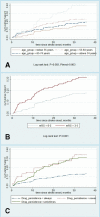Time to recurrence after first-ever ischaemic stroke within 3 years and its risk factors in Chinese population: a prospective cohort study
- PMID: 31857306
- PMCID: PMC6936994
- DOI: 10.1136/bmjopen-2019-032087
Time to recurrence after first-ever ischaemic stroke within 3 years and its risk factors in Chinese population: a prospective cohort study
Abstract
Objective: This study aimed to estimate the time of recurrent ischaemic stroke events among the first 3 years of follow-up after hospitalisation discharge.
Study design: A prospective cohort study.
Setting: The research was conducted in the Department of Neurology at a tertiary hospital, Chengdu of China, from January 2010 to June 2016.
Outcome measures: We estimated the restricted mean survival time (RMST) of ischaemic stroke recurrence for the first 3 years after discharge. Basic sociodemographic characteristics and major potential risk factors for recurrence were collected using a semistructured questionnaire. Regression analysis of RMST was used to identify risk factors of recurrent stroke.
Participants: Patients hospitalised with first-ever ischaemic stroke were eligible for this study. Patients with severe cognitive impairment were excluded.
Results: We included 641 surviving patients who were followed up for 3 years. Stroke recurrence occurred in 115 patients, including 16 patients who died of stroke recurrence. The cumulative risk of stroke recurrence rate was 11.51% (9.20%-14.35%) at 1 year, 16.76% (13.96%-20.05%) at 2 years and 20.07% (17.00%-23.61%) at 3 years. Modified Rankin Scale (mRS) score ≥3 thus resulted in the recurrence time loss, which was 0.22 months (p=0.008) at 6 months, 0.61 months (p=0.004) at 1 year, 1.49 months (p=0.007) at 2 years and 2.46 months (p=0.008) at 3 years. It is similar with the effects of drug adherence after stroke. The recurrence time of patients ≥75 years at 3 years was 2.02 months (p=0.220) less than that of those aged <55 years.
Conclusion: In China, the time of first recurrence varies among different patients with ischaemic stroke. The mRS and the level of drug adherence after stroke are important risk factors of stroke recurrence.
Keywords: epidemiology; public health; stroke medicine.
© Author(s) (or their employer(s)) 2019. Re-use permitted under CC BY-NC. No commercial re-use. See rights and permissions. Published by BMJ.
Conflict of interest statement
Competing interests: There are no financial or other interests to declare, and all authors agree to the publication of the manuscript.
Figures
Similar articles
-
Predictors for the prognosis and recurrence of ischaemic stroke among young Chinese patients: a cohort study.BMJ Open. 2022 May 2;12(5):e052289. doi: 10.1136/bmjopen-2021-052289. BMJ Open. 2022. PMID: 35501080 Free PMC article.
-
Clinical features, management and outcomes of severe ischaemic stroke in tertiary hospitals in China: protocol for a prospective multicentre registry-based observational study.BMJ Open. 2018 Oct 28;8(10):e024900. doi: 10.1136/bmjopen-2018-024900. BMJ Open. 2018. PMID: 30373783 Free PMC article.
-
Ischaemic stroke in young people: a prospective and long-term follow-up study.Cerebrovasc Dis. 2003;15(1-2):121-8. doi: 10.1159/000067139. Cerebrovasc Dis. 2003. PMID: 12499721
-
A hospital-based study on ischaemic stroke characteristics, management, and outcomes in Sarawak: Where do we stand?J Stroke Cerebrovasc Dis. 2020 Sep;29(9):105012. doi: 10.1016/j.jstrokecerebrovasdis.2020.105012. Epub 2020 Jun 18. J Stroke Cerebrovasc Dis. 2020. PMID: 32807427
-
Cumulative risk of stroke recurrence over the last 10 years: a systematic review and meta-analysis.Neurol Sci. 2021 Jan;42(1):61-71. doi: 10.1007/s10072-020-04797-5. Epub 2020 Oct 10. Neurol Sci. 2021. PMID: 33040195
Cited by
-
Incident Stroke and Its Influencing Factors in Patients With Type 2 Diabetes Mellitus and/or Hypertension: A Prospective Cohort Study.Front Cardiovasc Med. 2022 Feb 9;9:770025. doi: 10.3389/fcvm.2022.770025. eCollection 2022. Front Cardiovasc Med. 2022. PMID: 35224030 Free PMC article.
-
Effectiveness of a Health Education Program to Reduce Recurrence of Stroke by Controlling Modifiable Risk Factors in a Specialized Hospital in Bangladesh: Randomized Controlled Trial.JMIR Public Health Surveill. 2025 May 27;11:e72233. doi: 10.2196/72233. JMIR Public Health Surveill. 2025. PMID: 40424617 Free PMC article. Clinical Trial.
-
One-year recurrence of stroke and death in Lebanese survivors of first-ever stroke: Time-to-Event analysis.Front Neurol. 2022 Nov 14;13:973200. doi: 10.3389/fneur.2022.973200. eCollection 2022. Front Neurol. 2022. PMID: 36452174 Free PMC article.
-
Effectiveness of a Health Education Program for Patients Who Had a Stroke and Their Caregivers by Controlling Modifiable Risk Factors to Reduce Stroke Recurrence in a Tertiary Hospital in Bangladesh: Protocol for a Randomized Controlled Trial.JMIR Res Protoc. 2023 Dec 15;12:e51178. doi: 10.2196/51178. JMIR Res Protoc. 2023. PMID: 38100172 Free PMC article.
-
Diagnostic accuracy of updated risk assessment criteria and development of novel computational prediction models for patients with suspected choledocholithiasis.Surg Endosc. 2023 Sep;37(9):7348-7357. doi: 10.1007/s00464-023-10087-w. Epub 2023 Jul 20. Surg Endosc. 2023. PMID: 37474825
References
Publication types
MeSH terms
LinkOut - more resources
Full Text Sources
Medical


